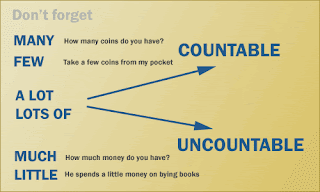Difference between 'fewer' and 'less'
'Fewer'-the comparative of few, is used before countable
nouns, and less-the comparative of little, before uncountable words.
Examples :
§
There are fewer actors working in the theatre
than there used to be.
§
She earns lesser than a peon does.
Take a note of the
following:
Positive. Comparative. Superlative
Few. Fewer. Fewest
Little. Less/Lesser. Least
'Fewer' and 'Less' are followed by than as they are the comparative
forms.
'Many' like 'few' is used before a countable noun.
Example:
§
Many/few students flunked the geography
examination.
'Much' like 'less' is used before a non-countable or a material noun.
Example:
§
Much/less water.
MODIFIERS- 'Too', ‘Very’, 'Enough'.
Very means to a high degree, but does not suggest impossibility.
§ Sushma is very intelligent.
§
Maria is too weak to attend your party.
It is advisable not to use 'too' with a positive adjective. Instead of
using 'too' it is better to use 'very'.
Enough suggests possibility or sufficient degree.
Example:
§
He is smart enough to win the competition.
Please take a note of
the following:
§
Always make sure to put enough after the
adjective.
§
Always add to+v(infinitive) after enough.
§
Enough can come before or after a noun to
express sufficiency.
Examples:
NOUN
Dennis had enough money to buy a villa.
NOUN
Dennis had money enough to buy a villa.
MODIFIERS-Negation
Here are some words that have negative meanings even though
you can't make out that they deliver a negative message.
Examples:
only,
scarcely,rarely, hardly,seldom and without.
§ Gary had scarcely enough money to buy movie
tickets.
§ They went to the picnic without food.
Please make a note of the following:
§'Scarcely' and 'Hardly' are followed by WHEN.
§
Hardly had I seen the space shuttle when it
disappeared.
§
Hardly did I see the space shuttle when it
disappeared.
§
'No sooner' is followed by than.(which
means as soon as)
§
As soon as I reached the theatre the movie
started.
§
No sooner had I reached the theatre than the
movie started.
§
No sooner+ had+subject+past
participle......than.
§
No sooner+ did+ subject+ present tense
verb....than.
§
No sooner did I reach the theatre than the movie
started.
§
Hardly/ Scarcely+ had + subject+ past
participle....when.....
§
Hardly had
I seen the space shuttle when it disappeared.
§
Hardly/Scarcely+did+ subject+ present tense
verb.....when.
§
Hardly did I see the space shuttle when it
disappeared.
H.A.P.P.Y-L.E.A.R.N.I.N.G....



No comments:
Post a Comment